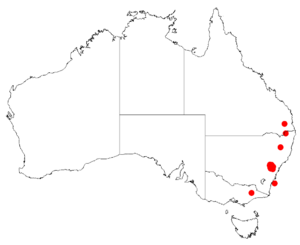Acacia asparagoides facts for kids
Quick facts for kids Acacia asparagoides |
|
|---|---|
| Scientific classification | |
| Genus: |
Acacia
|
| Species: |
asparagoides
|
 |
|
| Occurrence data from AVH | |
Acacia asparagoides is a type of shrub that belongs to the Acacia plant family. It is found naturally in the southeastern part of New South Wales, Australia.
What it Looks Like
This shrub can grow upright or spread out. It usually reaches a height of 0.3 to 2 meters (about 1 to 6.5 feet). Its branches are smooth or have very fine hairs, and they are mostly round.
The plant has tiny leaf-like parts called stipules, which are 1 to 2 millimeters long. Its green, stiff, and grouped 'leaves' are actually called phyllodes. These phyllodes are straight and narrow, about 0.8 to 1.5 centimeters long and 1 to 2 millimeters wide.
Acacia asparagoides mostly blooms between August and October. It produces flower clusters, called inflorescences, that grow one by one where the leaves meet the stem. These clusters form round flower-heads, about 4 to 6 millimeters across. Each flower-head has 15 to 30 bright yellow flowers.
After flowering, the plant produces flat, smooth, thin, and easily broken seed pods. These pods are 1.5 to 5 centimeters long and 2.5 to 4 millimeters wide.
How it Got its Name
The plant was first officially described by a botanist named Allan Cunningham in 1825. He included it in his writings about the plants of the Blue Mountains in New South Wales.
Later, in 2003, another botanist, Leslie Pedley, changed its name to Racosperma asparagoides. However, in 2006, it was moved back into the Acacia group.
The scientific name asparagoides comes from the fact that this shrub looks a bit like some types of asparagus.
Where it Grows
This shrub is found in the Blue Mountains region of New South Wales. You can see it growing between Newnes Junction and Lawson.
It prefers to grow in sandy soils, often on top of or near sandstone rocks. It is commonly found in dry sclerophyll forests (a type of forest with tough, leathery-leaved plants) and sometimes in heathland areas.

